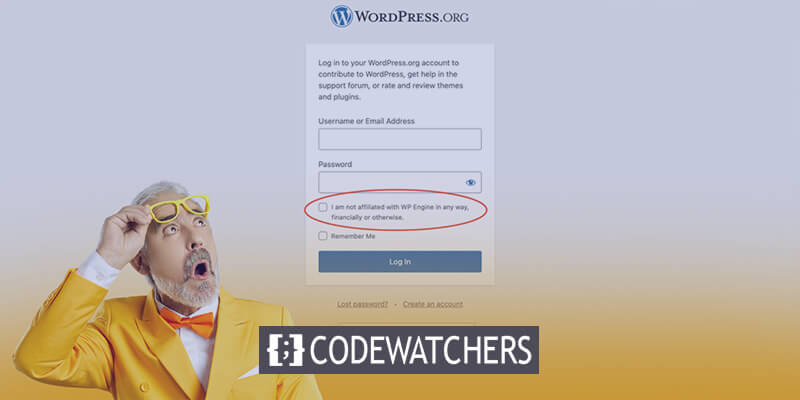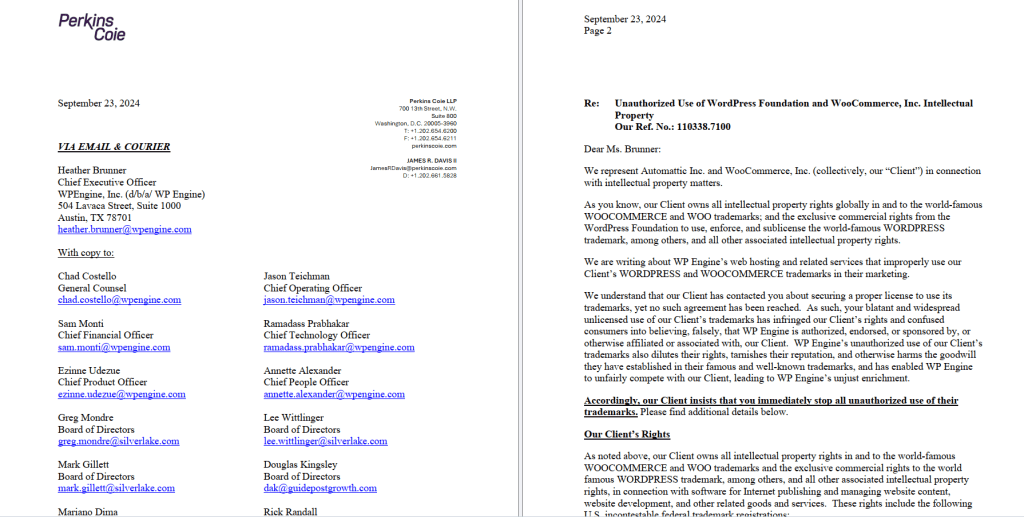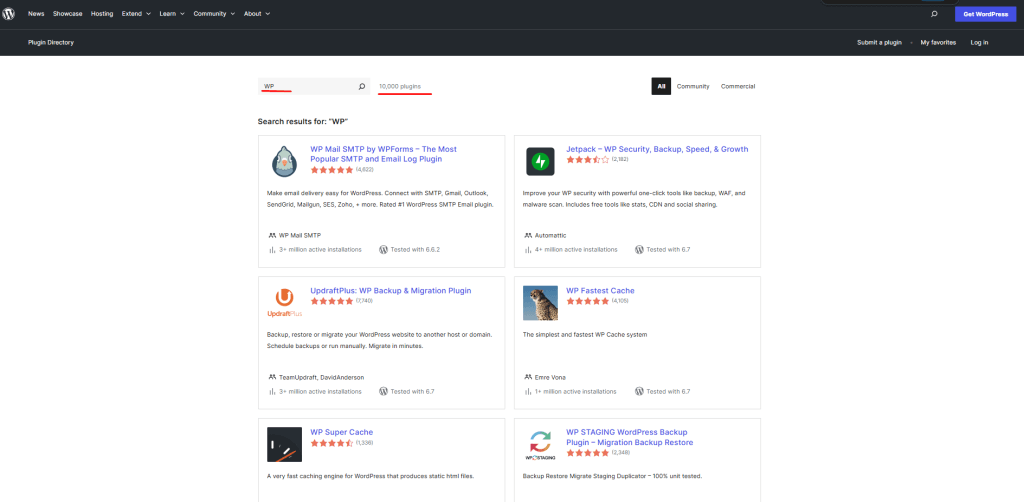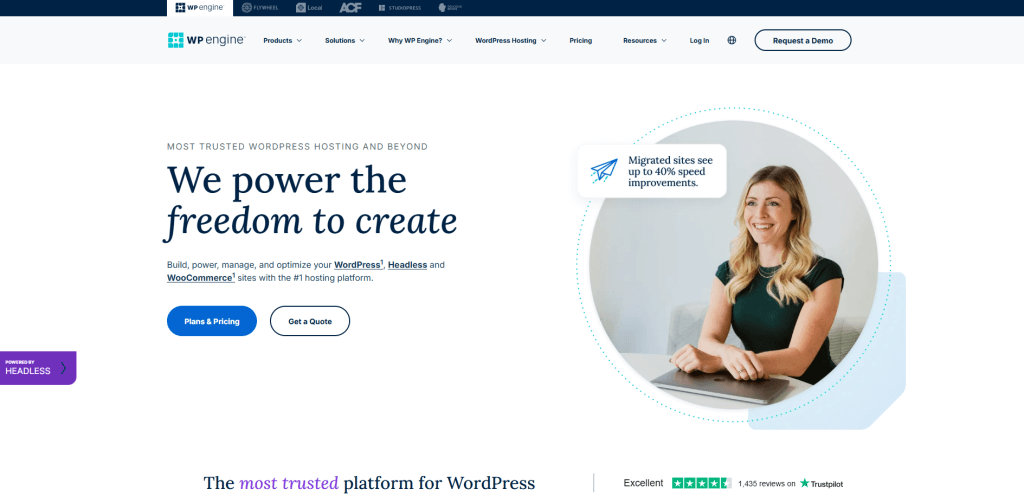The open-source CMS landscape is currently facing a significant challenge. A high-profile dispute between WordPress founder Matt Mullenweg and prominent hosting provider WP Engine has escalated into a legal battle, raising concerns within the community.

According to a report by WPZoom, WordPress powers over 43.6% of all websites globally, which counts around 493 million websites. Meanwhile, WP Engine, a popular choice for many high-traffic websites, including Mozilla.org, Cisco.com, and Xbox.com, hosted 1.5% of all websites this month, according to W3Techs.
The recent conflict between Mullenweg and WP Engine has disrupted website functionality for numerous users. This has sparked discussions about the potential risks of relying solely on open-source platforms and prompted some businesses to explore alternative, proprietary solutions.
This article will delve into the root causes of the dispute, its impact on WordPress users, and the broader implications for the open-source CMS community.
Create Amazing Websites
With the best free page builder Elementor
Start NowWordPress vs. WP Engine: How did it all start?
The conflict between WordPress and WP Engine began with a bang on September 21st when Matt Mullenweg, the founder of WordPress, published a scathing blog post titled "WP Engine is not WordPress." He went further the next day, publicly criticizing WP Engine and calling them a "cancer to WordPress."

WP Engine responded quickly on September 23rd, claiming Mullenweg's actions stemmed from concerns over their use of "WP" branding and their handling of post-revision tracking. They fired back with a cease-and-desist letter, but WordPress countered with their own legal action on the same day.

Things escalated quickly. By September 25th, Mullenweg blocked WP Engine's access to WordPress.org resources. This move crippled functionality for many websites hosted by WP Engine. Fortunately, the block was lifted temporarily just two days later on September 27th.
The legal battle continued into October. On October 2nd, WP Engine filed a lawsuit against Automattic (the owner of WordPress) and Mullenweg, accusing them of extortion and abuse of power. On the same day, WordPress released a term sheet sent to WP Engine in September requesting royalties for using WordPress and WooCommerce trademarks.
Employee dissatisfaction began to show on October 3rd. Nearly 160 Automattic employees (around 8.4% of the workforce) opted to leave the company, citing disapproval of how Mullenweg handled the situation with WP Engine.
The conflict took a surprising turn on October 12th. Mullenweg decided to take over a plugin previously owned by WP Engine. He justified this action by claiming similar situations had occurred but on a smaller scale. He emphasized that this takeover responded to WP Engine's legal attacks and wouldn't occur regularly with other plugins.

The entire situation has caused uncertainty within the open-source CMS community. We'll have to wait and see how this saga unfolds.
WordPress vs. WP Engine: Root cause of all the trouble
The core issue underlying the dispute between WP Engine and Mullenweg is a fundamental disagreement about the governance and control of open-source platforms. This raises broader concerns about the extent to which commercial entities should influence open-source projects.
From a business perspective, the fallout from this conflict extends beyond technical implications. The tension between commercial interests and open-source ideals has the potential to erode the collaborative spirit that has driven WordPress's success. This raises critical questions for businesses reliant on WordPress, including concerns about platform dependency, innovation, and long-term sustainability.
The dispute's specific origins can be traced back to disagreements over trademarks, site limitations, and ownership of key functionalities. Tensions escalated when Mullenweg perceived WP Engine's use of post-revision tracking as infringing on core WordPress functionality, leading to accusations of violating open-source principles.

Additionally, despite numerous plugins using the same abbreviation, WP Engine's use of "WP" in its branding further exacerbated the conflict and sparked a broader debate about the use of WordPress-related trademarks.
WordPress vs. WP Engine: Experts POV
The public opinion surrounding Matt Mullenweg's actions is quite divided. Many observers find his accusations hypocritical, pointing out that Automattic, his commercial venture, also benefits financially from the open-source WordPress platform. Some speculate his motivations are jealousy or fear of WP Engine's success.

Additionally, pre-existing tensions resurface with criticisms of Mullenweg's leadership style, specifically his handling of Gutenberg and WooCommerce implementations and his perceived controlling tendencies within the open-source community.
This discontent has even manifested in a compiled list of past controversies surrounding Mullenweg's actions. Common themes include his perceived overprotectiveness of the WordPress trademark, alleged anti-competitive behavior favoring Automattic ventures, and past clashes with competitors like GoDaddy and Wix. Calls for his resignation are not uncommon.
However, it's important to acknowledge the dissenting voices. Some individuals strongly disagree with WP Engine, leading to support for Mullenweg despite reservations about his motives. Others believe his core arguments regarding WP Engine's practices are valid, even if they question the sincerity due to potential bias arising from his competing business interests.
WordPress vs. WP Engine: What's Next?
After the recent dispute with WordPress founder Matt Mullenweg, WP Engine has the potential to impact the future of WordPress and its ecosystem significantly. If WP Engine starts developing its own plugin library, it could signal a significant shift away from the core WordPress project.
While it's possible for WP Engine to fork the WordPress source code, this would require substantial investment and effort to build a community and maintain a separate codebase. There's a risk of fragmenting the WordPress community and potentially hindering innovation.
Alternatively, WP Engine could continue using the core WordPress project without contributing. However, this would limit their access to the official plugin repository and could lead to compatibility issues and security risks.
Ultimately, the outcome of this dispute will have far-reaching consequences for both WP Engine and the broader WordPress community. It remains to be seen how this situation will unfold, but it's clear that the future of WordPress is at a crossroads.
Should WordPress Users Be Worried?
The recent conflict has raised concerns for some WordPress users. While the dispute primarily affects WP Engine's users, it's worth considering how the broader WordPress ecosystem might be impacted.
Here's what WordPress users should keep in mind:
Direct Impact
- WP Engine Users: If you're a WP Engine user, you may experience disruptions in service or limitations in plugin and theme functionality. It's crucial to stay updated on official announcements from WP Engine and WordPress.
- Other Hosting Providers: This dispute should not directly affect users of other hosting providers. However, the broader impact on the WordPress community could indirectly influence the development and support of the platform.
Indirect Impact
- Community Health: The conflict could strain the WordPress community and lead to divisions among developers and contributors, which could impact the platform's future development.
- Plugin and Theme Ecosystem: Any disruption to the WordPress ecosystem could affect the availability and quality of plugins and themes. However, the core WordPress project itself is unlikely to be significantly impacted.
What Should WordPress Users Do?
- Stay Informed: Keep an eye on official announcements from WordPress and your hosting provider.
- Maintain Regular Backups: Ensure that you have regular website backups to minimize potential disruptions' impact.
- Consider Diversification: If you're heavily reliant on a single hosting provider or plugin, consider diversifying your options to reduce risk.
- Support the Core Project: Continue to support the core WordPress project by contributing to the community, using official plugins and themes, and reporting bugs.
While the current situation is concerning, it's important to remember that WordPress remains a robust and widely used platform.
By staying informed and taking proactive steps, WordPress users can mitigate potential risks and ensure the smooth operation of their websites.
Wrapping Up
The recent clash between WordPress founder Matt Mullenweg and WP Engine has sent shockwaves through the open-source CMS community. This high-profile dispute can potentially significantly impact WordPress's future and ecosystem. While WP Engine users primarily feel the immediate consequences, the broader implications for the WordPress community are still unfolding.
As WordPress users, it's important to stay informed about the situation and take proactive steps to mitigate potential risks. By supporting the core WordPress project, diversifying hosting and plugin choices, and maintaining regular backups, users can ensure the continued success of their WordPress websites.





